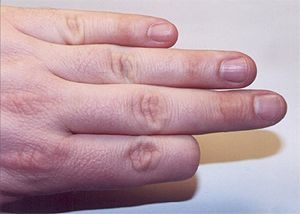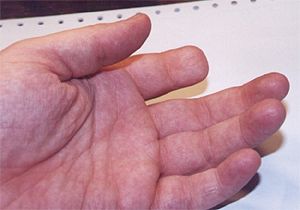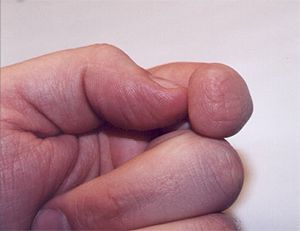 |
At age sixteen, "S" voluntarily cut off his own finger. BME talks to him about the politics and mechanics of why. |
BME: I know you did the amputation at 16 -- that's pretty young. What led up to it?S: I was very young, perhaps 7 or 8, when I discovered that I was fascinated by amputations. I still don't know what led up to that. This interest eventually mutated into a desire to have my own amputation. I continued to fantasize throughout my early teen years, often using string or rubber bands to tie off a limb or finger in the hopes that it would dry up and need to be amputated. It never worked; I always chickened out when the pain got bad enough.
The day I actually cut off my finger was no different. I had done all the steps on previous occasions, but never had the courage to follow through when it came time to cut. I don't know what was different on the big day, except that I somehow managed to make a pretty deep cut. Maybe I just wasn't paying attention. Once I'd made that cut, I decided that I might never be able to get that far again, so I decided to finish the amputation right there.
BME: Do you know now why you did it?S: Because I want to be an amputee. I need to be an amputee. I don't know how else to explain it. It's a driving need that I don't understand myself...but it's real, and it's strong.

BME: What was the exact procedure of the cutting? It sounds like it must have been a slow process?S: It was pretty straightforward. I used an ordinary utility knife (also known as a razor knife, box cutter, etc), using ice water to numb the finger, with a piece of string used as a tourniquet. My initial cut was across the top of the finger just above the last joint. From there I cut down and around...the hardest part was the large nerve that runs down the thumb side of the finger, because even with the ice water that nerve was still pretty sensitive.
BME: What was your family's reaction?S: They were understandably upset about the whole thing, more so because I couldn't -- wouldn't -- explain how the amputation had happened. These days they've all forgotten about it, or perhaps they just have the good sense to not ask me about it anymore.
BME: How did your friends react?S: They were curious, but nobody got too upset about it. I know that's not a great answer, but I've just never met anyone who made a big deal of it.
BME: What do you tell people now when they ask what happened to your finger?S: I usually say that I got my finger slammed in a car door. If someone presses for details I just say that I don't want to talk about it. Most people respect that.
BME: Have you expressed yourself with other body modifications as well?S: No. It's not as if I'm morally opposed to tattoos and piercing and such, I just haven't seen any that I wanted to have myself.
BME: Have you expressed yourself with other "self destructive behaviour" as well?
 S: No, I don't think so. I could be wrong.
S: No, I don't think so. I could be wrong.I routinely do web searches for info on self-mutilation, although I've never found very little of substance regarding self-amputation. I usually find a lot of info on lower-grade self-injuring behavior like cutting and burning. After learning more about SIB, I did try doing a cutting, I think mainly to find out where I stood with regard to this other kind of self-destructive behavior. To make a long story short, I found out that I'm not a cutter...I don't much care for pain, I didn't care for the bleeding (it wasn't satisfying, it was just messy), and I felt as if I hadn't accomplished anything by inflicting those cuts (mere scratches, in fact) on myself.
Some of my scars are indirectly due to my desire for amputation. From time to time I've experimented with ideas that could develop into a way to achieve my amputation. Some of those experiments left scars. Most of those scars are on the very limb I wish to have amputated, and that was a deliberate decision on my part -- if I have to make scars, I may as well make them on the "disposable" parts of my body rather than the parts I intend to keep. There's probably a deep and profound psychological meaning in that, but I think it's just good planning.
BME: Why do you think that people should have the right to do amputations? Doesn't society have the obligation to protect you and stop you from doing things like this?S: These two questions are aspects of the same issue. It's a very complex issue, and I can hardly begin to scratch the surface.
I believe it's a matter of individual rights as to what you do with your own body. As long as you're willing to take responsibility for your choices and abide by them, why not choose to amputate a limb?
The problem is whether you really can take responsibility. An amputation is usually a pretty expensive thing to go through. Prosthetic limbs can cost a lot of money, if you choose to use one. Unless you're pretty well-off, you can expect to share these expenses with others, such as your insurance carrier or government health bureau.
I'm a strong believer in individual rights, but I'm also aware that individuals collectively comprise a society, and that society has its own imperatives about what's best for its own survival. Is it in society's best interest to allow its members to modify themselves for personal reasons? Do these modifications affect the individual's value to society? Is it society's job to keep its individual members content, and if so, is it right for individuals to take advantage of society's proferred services in order to attain contentment?
It's a huge issue, and an important one. I don't have all the answers.
BME: If you cut your leg off, what obligation does society have to give you benefits, even ones as minor as using the handicapped parking spaces?S: That's a very good question. As a society, We don't differentiate between people whose disabilities were acquired purely by accident versus those who were disabled as a result of doing something stupid like driving drunk. If, for the sake of argument, we extend the definition of "stupid" to becoming disabled purely by choice, where does that leave us?
 A person's eligibility for disability benefits is a bit of a moving
target. The definitions of what does and does not qualify as a
disability has changed over the years, and continues to change -- I
can't keep up with it, myself. I can only say in my own defense that I
hope to avoid the issue entirely by staying independent and never having
a need to claim a disability benefit.
A person's eligibility for disability benefits is a bit of a moving
target. The definitions of what does and does not qualify as a
disability has changed over the years, and continues to change -- I
can't keep up with it, myself. I can only say in my own defense that I
hope to avoid the issue entirely by staying independent and never having
a need to claim a disability benefit.
BME: Are you interested in amputee lifestyle and fetishism (wearing braces, prosthetics, etc.), or more interested in just the amputation itself?S: Mostly it's just the amputation, but of course that includes things like crutches and prosthetics, and the "amputee lifestyle" as far as it applies to living life as an amputee. Focusing solely on the amputation is a fetish fantasy...there's nothing wrong with that, but it's nothing to do with real life. I've slowly come to realize that an amputation affects everything in a person's life, and even for someone like me there are bound to be aspects of it that I won't like.
BME: Is it the act or the end result that's more appealing to you?S: A little of both. If there were a way to have my leg removed without going through the process of injury and treatment, I would certainly take advantage of it, but since that isn't possible I'm forced to deal with the process that leads to amputation. Over time I've developed a casual interest in medicine and surgery, and I enjoy learning about those subjects.
BME: Do you find other amputees attractive?S: Yes, definitely. I'm turned on by attractive women, just like any guy, but an attractive woman with an amputation is far more stimulating for me. Guys are a little different...a male amputee definitely catches my eye, and I usually wonder how his amputation would look on me (not much different than wondering what I'd look like if I were as ripped and buff as some of those dudes at the gym).
BME: Have you found that there are people who find you more attractive because of your amputation?S: I can't say that I have. I don't attribute this to my amputation, though, since a missing fingertip is really not very noticeable. Even people with whom I spend a lot of time usually don't notice unless I point it out to them.
BME: "Cutter" on BME has described the sexual benefits of stimulation using the nail-less stump. Have you found this to be the case also?S: Not as much as I used to. Familiarity breeds boredom, I suppose.